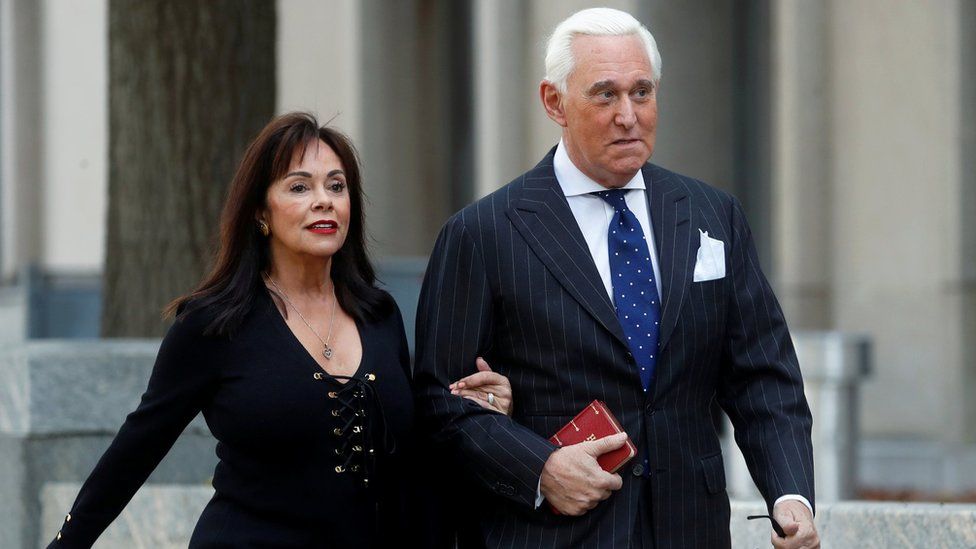Roger Stone: Trump ally convicted of lying to Congress
- Published

US President Donald Trump's adviser Roger Stone has been convicted on seven counts of lying to Congress, obstruction and witness tampering.
The court heard he lied about his efforts to learn more about when WikiLeaks would publish damaging emails about Hillary Clinton in 2016.
The jury returned its verdict on day two of deliberations in Washington DC.
Witness tampering carries a sentence of up to 20 years in prison. The other counts can carry five years each.
The court heard Stone lied in September 2017 during his testimony to the House of Representatives Intelligence Committee's inquiry into alleged Russian interference in the US elections a year earlier.
He was asked about WikiLeaks' release of damaging emails about Mrs Clinton - President Donald Trump's Democratic rival in the vote.
How have people reacted?
After Friday's verdict Mr Trump claimed that Stone had been the victim of "a double standard", arguing that the likes of Mrs Clinton and former law enforcement and intelligence chiefs he has sparred with had also told lies.
Allow Twitter content?
This article contains content provided by Twitter. We ask for your permission before anything is loaded, as they may be using cookies and other technologies. You may want to read Twitter’s cookie policy, external and privacy policy, external before accepting. To view this content choose ‘accept and continue’.
But John Podesta, the Clinton campaign chairman whose emails were hacked, gloated over Stone's conviction.
Allow Twitter content?
This article contains content provided by Twitter. We ask for your permission before anything is loaded, as they may be using cookies and other technologies. You may want to read Twitter’s cookie policy, external and privacy policy, external before accepting. To view this content choose ‘accept and continue’.
US intelligence officials and Department of Justice Special Counsel Robert Mueller later concluded those messages had been stolen by Russian hackers.
What did Stone do?
Stone is the sixth Trump aide or adviser convicted in a criminal case resulting from Mr Mueller's since-concluded investigation.
The trial heard Stone had told five lies under oath, including about his conversations with Trump campaign officials and a supposed "intermediary" with WikiLeaks in early August 2016.
He also lied about the existence of certain texts or emails.
Prosecutors told the court that Stone had made the false statements to protect Mr Trump's image.
Stone maintained the case against him was politically motivated.
Embarrassing for all?
Roger Stone, who served as an informal political adviser to Mr Trump for decades, was convicted of lying to Congress, among other offences. But it wasn't so much the fact that he lied, as it was what he lied about that could be politically damaging to Donald Trump.
Federal prosecutors presented evidence during the trial that the 2016 Trump campaign viewed Stone as a conduit through which it could learn about the hacked Democratic documents that WikiLeaks possessed and when that material might be released.
According to testimony by Rick Gates, deputy chairman of Trump's presidential campaign, then-candidate Trump had a telephone conversation with Stone discussing WikiLeaks.
The president has said under oath that he did not recall any such conversations. His team has also disavowed any connection or coordination with WikiLeaks, which US intelligence agencies have concluded was being used by Russia to distribute the hacked Democratic material.
Stone, prosecutors said, knew that if he truthfully testified about his efforts to reach out to WikiLeaks and pass information along to the campaign, it would at the very least be embarrassing for all involved. That, they concluded, is why he lied.
Now that information is out anyway. And Roger Stone is facing years of incarceration.
Stone had also tipped off the Trump campaign about new batches of damaging emails.
He told Congress his intermediary with WikiLeaks was New York radio host and comedian Randy Credico, who interviewed Assange in 2016 - but prosecutors said Stone's actual go-between with WikiLeaks was a conservative author, Jerome Corsi.
When Credico later testified to US lawmakers, he said Stone had advised him to "do a 'Frank Pentangeli'" - referring to a character in the Godfather movies who lies to Congress.
Stone also threatened Credico's therapy dog, Bianca, saying he was "going to take that dog away from you", the trial heard.
Meanwhile, former White House chief strategist Steve Bannon also testified against Stone during the trial - telling the court he had boasted about his links to WikiLeaks and its founder Julian Assange.
What happened in court?
Stone appeared not to react to the verdict, ignoring a command to stand as it was being read out. As the jury reaffirmed their votes, he put his glasses back on to watch them.
Former Trump campaign adviser Michael Caputo also refused to stand as the jury was leaving, despite being ordered to by a security officer. He was promptly removed from the courtroom.
Prosecutors alleged that Stone communicated with conspiracy theorist Alex Jones about the case on Thursday night, breaking a gag order.
When Judge Jackson asked if this was true, Stone denied it - audibly telling his lawyers, "it's not" - but the judge added that she had "serious concerns", both about the gag order and about the "nature" of some of the people at the hearing.
Among the media figures present at court were Gavin McInnes, founder of the far-right group Proud Boys, and Milo Yiannopolous.
As Stone left the hearing, he told reporters who asked for comment that he had "none whatsoever", before posing for photos.